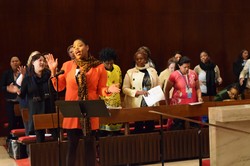Last week, the Presbyterian Church (U.S.A.)’s delegation of young women and Presbyterian Women from across the country gathered with Lutherans, Methodists, and other worldwide ecumenical partners in New York City for the 59th Session of the Commission on the Status of Women at the United Nations. During the gathering, women discussed an array of shared concerns, including women and poverty, education and training of women, violence against women, and women and the economy.
The focus of this year’s Commission was the 20th anniversary of the Beijing Declaration and Platform for Action—an agenda focused on women’s empowerment that aims to remove all the obstacles to women’s active participation in all spheres of public and private life through a full and equal share in economic, social, cultural and political decision making—including current challenges that affect its implementation and the achievement of gender equality and the empowerment of women. At a panel discussion hosted by the Presbyterian Church (U.S.A.) as a parallel event to the Commission’s agenda, discussions focused on building the capacity of faith communities to address gender-based violence.
Panelists from Harvard Divinity School, Faith Trust Institute, and Advance Alaska talked about the importance of collaboration among faith communities and organizations that serve those who face gender-based violence. They gave specific examples of their day-to-day work, as well as their hope to create sacred spaces in individual faith communities where victims are safe and resources are freely shared. Rev. Dr. Marie M. Fortune, founder and senior analyst at Faith Trust Institute, said, “Gender-based violence isn’t about other people—it’s about our people.”
Robina Niaz, executive director of Turning Point, a community-based nonprofit organization that addresses the needs of Muslim women and children, said, “When I look at the past 20 years, I don’t think we’ve really come that far. What are we celebrating? How are we collaborating? We must learn to put our egos aside and come together to collaborate and address these issues together. We can’t simply sit back and watch one group of women suffer because we’re primarily focused on competing for resources.” According to Rev. Richard Irwin, founder and current president of Advance Alaska, “Collaboration builds capacity.”
Earlier in the day, the PC(USA) delegation joined with representatives from the World Council of Reformed Churches and other partner organizations to plan and host a special worship service centered around the text from 1 Kings 17: 8-16, addressing the issue of women in poverty. “Being able to join together to plan and share this worship service during the Commission is so special. This experience has been a huge blessing and definitely one of the highlights of this event for me,” said LaThelma Armstrong, one of the eleven young women who participated in the service and attended the Commission on the Status of Women through scholarship support from the Women’s Leadership Development & Young Women’s Ministries Office in Racial Ethnic & Women’s Ministries.
Racial Ethnic & Women’s Ministries’ participation at the Commission on the Status of Women is made possible through a partnership with the Presbyterian Ministry at the United Nations, and the Presbyterian Church (U.S.A.)’s status as an accredited nongovernmental organization (NGO) with the United Nations’ Economic and Social Council.

